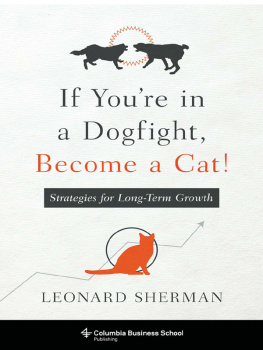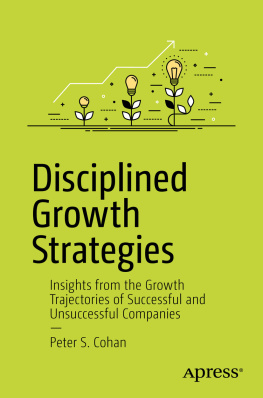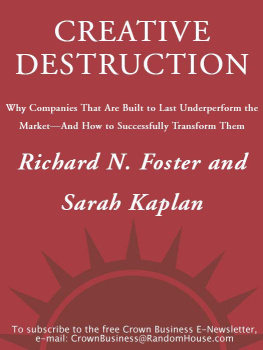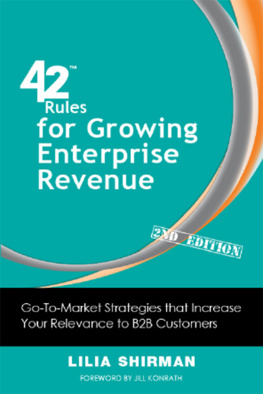Leonard Sherman - If You’re in a Dogfight, Become a Cat!: Strategies for Long-Term Growth
Here you can read online Leonard Sherman - If You’re in a Dogfight, Become a Cat!: Strategies for Long-Term Growth full text of the book (entire story) in english for free. Download pdf and epub, get meaning, cover and reviews about this ebook. year: 2017, publisher: Columbia University Press, genre: Business. Description of the work, (preface) as well as reviews are available. Best literature library LitArk.com created for fans of good reading and offers a wide selection of genres:
Romance novel
Science fiction
Adventure
Detective
Science
History
Home and family
Prose
Art
Politics
Computer
Non-fiction
Religion
Business
Children
Humor
Choose a favorite category and find really read worthwhile books. Enjoy immersion in the world of imagination, feel the emotions of the characters or learn something new for yourself, make an fascinating discovery.
- Book:If You’re in a Dogfight, Become a Cat!: Strategies for Long-Term Growth
- Author:
- Publisher:Columbia University Press
- Genre:
- Year:2017
- Rating:4 / 5
- Favourites:Add to favourites
- Your mark:
If You’re in a Dogfight, Become a Cat!: Strategies for Long-Term Growth: summary, description and annotation
We offer to read an annotation, description, summary or preface (depends on what the author of the book "If You’re in a Dogfight, Become a Cat!: Strategies for Long-Term Growth" wrote himself). If you haven't found the necessary information about the book — write in the comments, we will try to find it.
Businesses often find themselves trapped in a competitive dogfight, scratching and clawing for market share with products consumers view as largely undifferentiated. Conventional wisdom suggests that dogfights are to be expected as marketplaces mature, giving rise to the notion that there are bad industries where it is unlikely that any company can succeed.
But there are notable exceptions in which enlightened executives have changed the rules to grasp the holy grail of business: long-term profitable growth. Rather than joining the dogfights raging within their industry, companies such as Apple, FedEx, and Starbucks have chosen to become metaphorical cats, continuously renewing their distinctive strategies to compete on their own terms.
In If Youre in a Dogfight, Become a Cat, Leonard Sherman draws on four decades of experience in management consulting, venture capital, and teaching business strategy at Columbia Business School to share practical advice on two of the most vexing issues facing business executives: why is it so hard to achieve long-term profitable growth, and what can companies do to break away from the pack?
Sherman takes the reader on a provocative journey through the building blocks of business strategy by challenging conventional wisdom on a number of questions that will redefine management best practices:
What should be the overarching purpose of your business? Do you really know what your strategy is? Is there such a thing as a bad industry? Where do great ideas come from and how do I find them? What makes products meaningfully different? What makes and breaks great brands? How and when should I disrupt my own company? What are the imperatives to achieving long-term profitable growth?
Filled with dozens of illustrative examples of inspiring successes and dispiriting falls from grace, this book provides deep insights on how to become the cat in a dogfight, whether you are a CEO, mid-level manager, aspiring business school student, or curious observer interested in achieving sustained profitable growth.
Leonard Sherman: author's other books
Who wrote If You’re in a Dogfight, Become a Cat!: Strategies for Long-Term Growth? Find out the surname, the name of the author of the book and a list of all author's works by series.







